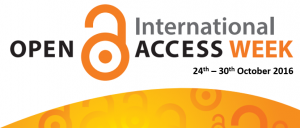 As part of Open Access Week 2016, here at EPrints HQ we are pleased to be able to share the following updates about our work to continue supporting the open access, open education and open data communities. Come back for further updates as the week progresses.
As part of Open Access Week 2016, here at EPrints HQ we are pleased to be able to share the following updates about our work to continue supporting the open access, open education and open data communities. Come back for further updates as the week progresses.
*NEW* EPrints 3.4 Impact flavour coming soon
We are pleased to announce that through a project with the University of Glasgow, we are currently in the process of creating a new flavour compatible with EPrints 3.4 to create a repository optimised for capturing Impact data. This solution will allow researchers to capture impact related data and allow institutions to gain an insight into their research activities, from influencing policy through to public engagement outreach. This type of data is also becoming increasingly import to research funders and EPrints will be continue to develop this offering in line with these needs.
Embeddable HTML5 player in EdShare
Our EPrints for Open Education solution EdShare continues to grow on it’s new EPrints 3.3 platform. We have recently developed and deployed an embeddable HTML5 player which allows video and audio resources to be displayed directly in external environments such as Blackboard, without the need to specify the format. Combined with EdShare’s support to produce multiple derivatives of an uploaded video or audio file, this ensure users wont be disappointed when they access your content from their own device.
Announcement from edShare@GCU on their new embeddable HTML5 player
ORCID Support in EPrints
We are pleased to announce the release of the new EPrints Bazaar plugin – ORCID Support – offering the groundwork for future ORCID integration with EPrints. This plugin arrives in the wake of Liz Jennings’ and Helen Cooper’s report, “ORCID EPrints Implementation Survey Analysis”, the “ORCID API and use case workshop: Jisc UK consortium member’s event” held in Birmingham earlier this month, and the subsequent hackday.
Further information available here
24th – 30th October 2016 is Open Access week, an opportunity for the academic and research community to continue to learn about the potential benefits of Open Access, to share what they’ve learned with colleagues, and to help inspire wider participation in helping to make Open Access a new norm in scholarship and research.
